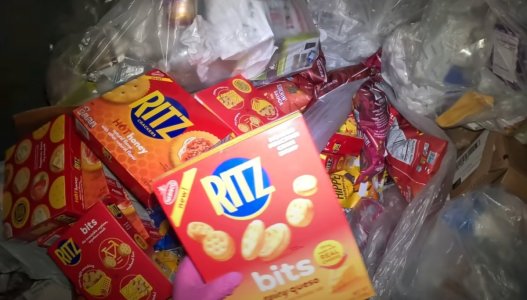
When Mary from Phoenix tells her neighbors about her latest "finds"—a working KitchenAid mixer, barely used furniture, and enough canned goods to fill her pantry—she doesn’t mention where she found them. That’s because Mary has joined a growing movement of Americans who are discovering that one person’s trash really can be another person’s treasure. As evidenced by the influx of blogs, social media threads and chats, dumpster diving has been gaining massive popularity—and it doesn’t seem to be slowing down.
What was once considered a last resort has become a surprisingly mainstream way to combat rising living costs.
From designer shoes worth hundreds of dollars to perfectly good groceries, Americans are finding that dumpsters can yield thousands of dollars’ worth of usable items.
But before you grab your gloves and flashlight, there’s a lot you need to know about this trend—especially the legal and safety considerations that are crucial for anyone over 60.
The Legal Landscape You Need to Understand
Here’s something that might surprise you: dumpster diving is legal in all 50 states thanks to the Supreme Court case California vs. Greenwood, which ruled that as long as the dumpster or trash is on public property, there is no expectation of privacy.
Once someone puts their garbage out for collection, it’s considered public domain.
However—and this is a big however—the devil is in the details.
While it is legal in most other parts of North America, dumpster divers can be prosecuted for loitering and trespassing.
If that dumpster sits on private property (which most do), you could face serious legal trouble for accessing it.
"While it is legal in most other parts of North America, dumpster divers can be prosecuted for loitering and trespassing"
The key is understanding where the property lines are drawn.
Dumpsters behind shopping centers, in store parking lots, or on business premises are typically off-limits.
Municipal garbage bins or items left at the curb for pickup are generally fair game, but local ordinances can vary significantly.
Also read: From trash to treasure: How a glam mom turned dumpster diving into a $30K goldmine
What People Are Actually Finding
The stories of valuable discoveries aren’t just social media hype.
According to original reporting, people are finding everything from working appliances worth thousands of dollars to designer goods that would cost a month’s Social Security payment.
College move-out seasons have become particularly lucrative times, with divers reporting hauls that include mini-fridges, microwaves, furniture, and even luxury items like Valentino sneakers worth nearly $1,000.
One diver in North Carolina found roughly 70 items valued at around $6,600 during Duke University’s spring move-out period.
Retail locations also dispose of surprising amounts of sellable merchandise.
From barely worn designer shoes to brand-new household items, stores often throw away products rather than discount them heavily.
Some dedicated divers report finding $20,000 worth of brand-new goods in a single year.
Most Valuable Categories of Discarded Items
Working appliances (refrigerators, microwaves, dehumidifiers)
Brand-new building materials and tools
Designer clothing and accessories
Furniture in good condition
Non-perishable food items
Electronics and small appliances
Also read: Is there hidden gold on your favorite hiking trails? See what these hikers discovered!
Serious Safety Concerns for Older Adults
While the financial appeal is clear, the safety risks are significant—especially for anyone over 60.
Some people throw away used needles that you do not want to pierce yourself with when digging through the dumpster.
Sharp objects, broken glass, and unstable footing inside dumpsters create real injury risks.
For seniors, these dangers are amplified.
Balance issues, medication effects, reduced vision in low light, and slower reaction times all make dumpster diving particularly risky.
Falls from dumpster edges, cuts from sharp objects, or exposure to hazardous materials could result in serious injuries requiring expensive medical treatment.
There’s also the legal liability aspect.
Property owners worry about injury lawsuits, which is why many businesses are installing locks, fences, and surveillance systems around their dumpsters.

Also read: Hidden treasure in farmhouse walls reveals family's forgotten fortune
The Environmental Angle That Resonates
For a generation that lived through the Great Depression and World War II rationing, the waste aspect of this trend likely strikes a chord.
Compounding cost-of-living crises—including supermarket price rises, inflation, welfare cuts, and insecure housing—are leading an unprecedented number of people to take a dive for the first time.
The environmental benefits are real.
By rescuing usable items from waste streams, dumpster divers help reduce landfill burden and extend the life of manufactured goods.
It’s a form of grassroots recycling that aligns with values many seniors hold dear about not wasting resources.
However, research shows this practice is most common among those facing genuine financial hardship.
Nearly one-fifth of those surveyed had used dumpster diving as a means to obtain food in low-income urban communities, suggesting it’s often necessity rather than environmental activism driving this behavior.
Also read: 30 surprising money tricks people swear by—some might actually work
Better Alternatives for Seniors
Before considering dumpster diving, seniors have access to numerous safer alternatives that can provide similar financial relief:
Food assistance programs:
- SNAP (food stamps) benefits
- Senior Farmers Market Nutrition Program
- Local food banks and pantries
- Meals on Wheels programs
Discount programs:
- Senior discounts at major retailers
- Prescription assistance programs
- Utility bill assistance
- Property tax exemptions
Community resources:
- Estate sale previews
- Church and community group exchanges
- Neighborhood buy-nothing groups
- Senior center programs
Also read: Love a good deal? This city is the thrift capital of America
If You're Still Considering It
For those who might still be tempted despite the risks, here are essential safety guidelines:
Legal protection:
- Research local ordinances thoroughly
- Never enter private property
- Stick to curbside pickups only
- Be prepared to leave immediately if asked
Safety essentials:
- Go during daylight hours when possible
- Wear thick-soled shoes and protective clothing
- Bring a flashlight and first aid kit
- Never dive alone - bring a companion
- Keep your phone charged for emergencies
Health precautions:
- Avoid food items unless you're experienced in food safety
- Wash hands thoroughly afterward
- Check tetanus vaccination status
- Trust your instincts about unsafe situations
What You Need to Know About Dumpster Diving
- Legal in all 50 states but trespassing and loitering laws still apply
- Safety risks are significant, especially for seniors
- Rising costs are driving more people to try it for the first time
- Safer alternatives exist through community programs and senior discounts
- Environmental benefits are real but don't outweigh personal safety concerns
Also read: This $40 thrift store find turned out to be worth over $2,000—here’s how it happened
The Bigger Picture
This trend reflects broader economic pressures affecting Americans, particularly those on fixed incomes.
While the stories of valuable finds are compelling, they shouldn’t overshadow the underlying issues of affordability and access to basic necessities.
For seniors specifically, the combination of physical risks, legal complexities, and social stigma makes dumpster diving a particularly challenging option.
The time and energy required might be better invested in accessing existing senior benefit programs and community resources.
Did you know?
Did you know?
Many communities have "Really Really Free Markets" - events where people bring items they no longer need and others can take what they want, no questions asked. These events provide similar benefits to dumpster diving but in a safer, legal, and more social environment.
The reality is that while dumpster diving has gained social media popularity and can yield valuable finds, it’s not necessarily the best solution for seniors facing financial pressures.
Understanding all your options—from legal assistance programs to community resources—will likely serve you better in the long run.
Read next:
- This man bought a $2.99 thrift store bracelet and couldn't believe its shocking true value—find out what it's really worth!
- Thrift store finds: What’s the secret behind this anonymous donor’s rare gold coin worth thousands?
- This rare Pyrex dish could be worth $6,000—do you have one in your cabinet?
What’s your take on this growing trend? Have you noticed more waste in your community, or have you found other creative ways to stretch your budget?
Share your thoughts and experiences in the comments below—we’d love to hear how you’re navigating today’s economic challenges.
Primary Source
https://www.the-sun.com/money/15300032/free-stuff-dumpster-diving-taboo/
Dumpster Diving: A Growing Trend and an Increasing Nuisance | Stealth Monitoring
Cited text: As evidenced by the influx of blogs, Reddit threads and Discord chats, dumpster diving has been gaining massive popularity and it doesn’t seem to be s...
Excerpt: As evidenced by the influx of blogs, Reddit threads and Discord chats, dumpster diving has been gaining massive popularity and it doesn't seem to be slowing down.
https://stealthmonitoring.com/crime...ng-a-growing-trend-and-an-increasing-nuisance
Dumpster Diving Legal States 2025
Cited text: If you decide to give dumpster diving a try, keep in mind that it is legal in all 50 states. The Supreme Court Case California vs. Greenwood ruled tha...
Excerpt: dumpster diving is legal in all 50 states thanks to the Supreme Court case California vs.
https://worldpopulationreview.com/state-rankings/dumpster-diving-legal-states
Dumpster Diving: A Growing Trend and an Increasing Nuisance | Stealth Monitoring
Cited text: While it is legal in most other parts of North America, dumpster divers can be prosecuted for loitering and trespassing.
Excerpt: While it is legal in most other parts of North America, dumpster divers can be prosecuted for loitering and trespassing.
https://stealthmonitoring.com/crime...ng-a-growing-trend-and-an-increasing-nuisance
Dumpster Diving Legal States 2025
Cited text: Some people throw away used needles that you do not want to pierce yourself with when digging through the dumpster.
Excerpt: Some people throw away used needles that you do not want to pierce yourself with when digging through the dumpster.
https://worldpopulationreview.com/state-rankings/dumpster-diving-legal-states
Full article: Diving into shadow places: dumpster diving, food waste, and care
Cited text: Compounding cost-of-living crises, including supermarket price rises, inflation, welfare cuts, and insecure housing, are leading an unprecedented numb...
Excerpt: Compounding cost-of-living crises, including supermarket price rises, inflation, welfare cuts, and insecure housing, are leading an unprecedented number of people to take a dive for the first time.
https://www.tandfonline.com/doi/full/10.1080/14649365.2025.2541822
Attitudes, beliefs, and prevalence of dumpster diving as a means to obtain food by Midwestern, low-income, urban dwellers | Request PDF
Cited text: Nearly one-fifth of those surveyed had used dumpster diving as a means to obtain food.
Excerpt: Nearly one-fifth of those surveyed had used dumpster diving as a means to obtain food
https://www.researchgate.net/public..._food_by_Midwestern_low-income_urban_dwellers






